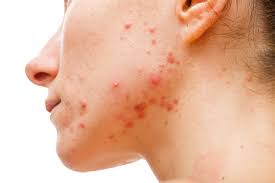
Hormonal Breakouts: A Woman's Battle and the Path to Clear Skin
Share
Hormonal breakouts are a common skin concern for many women, particularly during specific life stages like puberty, menstruation, pregnancy, and menopause. These breakouts can range from mild to severe, and they can significantly impact a woman's self-esteem.
Understanding Hormonal Breakouts
Hormonal fluctuations can disrupt the delicate balance of oil production in the skin. When hormone levels rise, especially those of androgen, the skin's sebaceous glands produce excess sebum. This excess oil can clog pores, leading to the formation of whiteheads, blackheads, and inflammatory acne.
Treatment Options for Hormonal Breakouts
While there's no magic cure for hormonal breakouts, several effective treatment options can help manage and improve the condition:
-
Over-the-Counter Treatments:
- Benzoyl peroxide: This ingredient kills bacteria that contribute to acne.
- Salicylic acid: This beta-hydroxy acid helps unclog pores.
- Sulfur: This ingredient can reduce inflammation and oil production.
-
Prescription Medications:
- Topical retinoids: These medications can help unclog pores and reduce inflammation.
- Oral contraceptives: Birth control pills can help regulate hormone levels and reduce acne.
- Spironolactone: This medication can help reduce androgen levels and oil production.
-
Professional Treatments:
- Chemical peels: These treatments can help remove dead skin cells and unclog pores.
- Microdermabrasion: This procedure can help exfoliate the skin and reduce the appearance of acne scars.
- Extractions: A professional can safely remove blackheads and whiteheads.
Diet and Lifestyle Tips for Clear Skin
In addition to topical treatments, incorporating healthy lifestyle habits can significantly improve your skin's overall health:
-
Balanced Diet:
- Consume plenty of fruits, vegetables, and whole grains: These foods are rich in antioxidants and fiber, which can help regulate hormone levels and improve digestion.
- Limit processed foods, sugary drinks, and dairy products: These foods can trigger inflammation and worsen acne.
- Include omega-3 fatty acids: Fatty fish like salmon and mackerel, as well as flaxseed and chia seeds, can help reduce inflammation.
- Hydration: Drink plenty of water to keep your skin hydrated and flush out toxins.
- Stress Management: Practice relaxation techniques like yoga, meditation, or deep breathing to reduce stress, which can exacerbate acne.
- Gentle Skin Care: Use gentle, non-comedogenic cleansers and moisturizers to avoid irritating your skin.
- Avoid Touching Your Face: This can transfer bacteria and worsen breakouts.
Remember, it's important to consult with a dermatologist to develop a personalized treatment plan for your specific skin concerns. With patience and consistent effort, you can achieve clearer, healthier skin.







